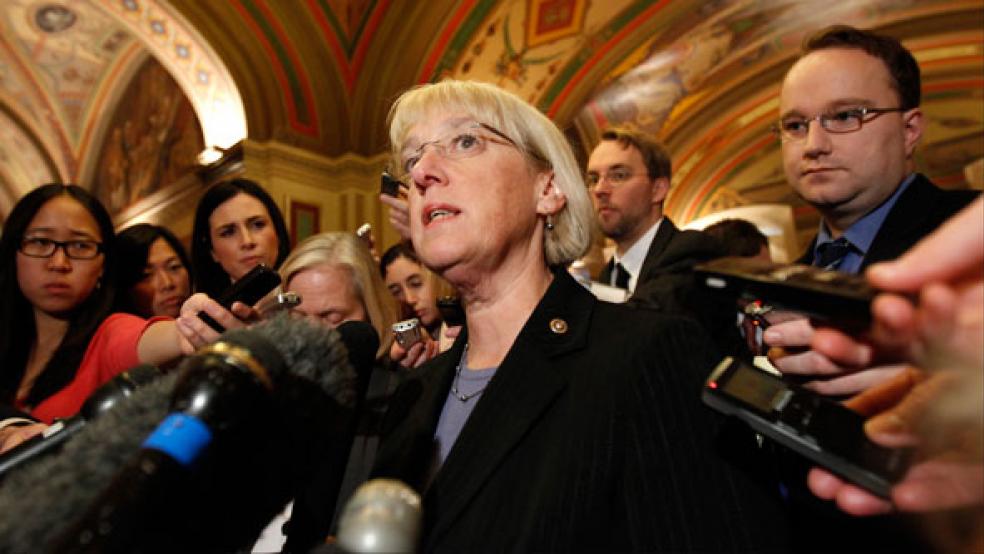For months, both parties have warned that the country was barreling toward a fiscal cliff of massive tax increases and government spending cuts that would send the economy back into a tailspin unless a compromise was cobbled together before the end of the year.

But in a dramatic turnabout, President Barack Obama and congressional Democrats are signaling that they would rather risk the economy hurtling back into recession next year than accept Republican demands that the Bush era tax cuts be extended for those earning more than $250,000.
Presumptive Republican president nominee Mitt Romney and his fellow conservatives on Capitol Hill insist on extending the tax cuts set to expire for all Americans, including the wealthiest two percent.
Republican control of the House has left Democrats with the choice of either agreeing to continue the lower rates for wealthier Americans, or watching as they all expire and the country plunges back into a downturn. The Democrats would now prefer to hazard the hard landing. Their gambit depends entirely on the danger of a financial shock severe enough to force GOP lawmakers to back down, yet not so overpowering that it triggers a vicious slump.
“I will not agree to a deal that throws middle class families under the bus and forces them to bear this burden alone,” Sen. Patty Murray, a Democratic leader from Washington State, said in a Monday speech at the Brookings Institution. “Unless Republicans end their commitment to protecting the rich above all else, our country is going to have to face the consequences of Republican intransigence.”
Murray noted that tumbling off the fiscal cliff—which the Congressional Budget Office projects would cause a recession for the first half of 2013—would produce millions of lost jobs and cause markets to go haywire. Yet unlike late 2010 when Democrats agreed to extend the tax breaks first passed by President George W. Bush, they claim to be ready to endure the possible fallout.
The speech was delivered less than a week after Obama assured congressional Democrats during a White House meeting that he would veto any attempt to preserve the Bush tax cuts on income over $250,000 a year, the Washington Post reported. Murray’s warning also comes after Senate Majority Leader Harry Reid, D-Nev., dismissed calls from Republicans and some conservative Democrats to blunt deep automatic cuts in the defense budget that are scheduled to take place beginning in early January.
The irony of this unfolding standoff is that the White House and congressional Democrats spent the better part of two years claiming that Republicans were pushing the economy back into the tank by advocating draconian cuts in spending, not to mention a first-ever government default by blocking an increase to the debt ceiling until the final minute last summer.
Now it appears that the Democrats have embraced a strategy they once reviled, despite Federal Reserve Chairman Ben Bernanke declaring at an April news conference that monetary policy alone would not be able to blunt the impact of the tax hikes and spending reductions at the start of next year. Morgan Stanley anticipates that the fiscal cliff would represent a substantial 5 percent drag on gross domestic product.
“The threat to let the whole kit and caboodle expire at the end of the year is a brilliant negotiating tactic,” Alice Rivlin, former director of the White House Office of Management and Budget under President Bill Clinton, said in a panel following Murray’s speech. But spooked by the possible economic consequences, Rivlin added, “I hope it doesn’t happen.”
Republicans were quick to criticize the Democratic strategy, even though it resembles their own past efforts when bargaining with the administration. “Democrats are now openly admitting that they plan to wait until this debate reaches full throttle and Americans are panicked about the outcome to do anything, because they think it will make it likelier they’ll get their way,” said Senate Minority Leader Mitch McConnell, (R-Ky.) in a Monday floor speech. “They’re ready to accept the economic and fiscal consequences. They see a crisis coming, and they don’t want to waste it.”
For the threat to be credible, Obama needs to convince Republicans that he is willing to jeopardize his own legacy should he win re-election in November. That will be a tough sell by a president who has previously embraced a reputation as being reasonable and responsible.
“Playing chicken is convincing the other side that you’re crazy enough to crash, so they swerve,” Sean West, director of U.S. political analysis for the Eurasia Group, told The Fiscal Times. “But no president wants to come into office having just set into motion a 5 percent drag in GDP.”
Not all economists see the Democratic strategy as damaging to an economy still struggling to recover from the 2008 financial crisis. Analysis by the liberal Center on Budget and Policy Priorities suggest the cliff would be more of a slope rather than a steep drop-off, a gradient that would be just right for generating enough market and public pressure on lawmakers to reach an agreement before a full-blown recession would be unleashed.
After Murray spoke, the center’s founder and president Robert Greenstein predicted, “ If we don’t have a deal by January 1, I think we’ll have a deal by the end of January.”
The move by Democrats speaks to a broader sense of desperation about how they’ve negotiated with Republicans. Super committees on the deficit have failed to achieve results, as have closed-door meetings between senior administration officials and House Republican committee chairmen, not to mention a golf outing that was supposed to foster a personal connection between Obama and House Speaker John Boehner, R-Ohio.
Former Republican congressman Bill Frenzel from Minnesota lamented after listening to Murray that the fiscal cliff might finally do the trick.
“Maybe,” he said, “it’s the insanity that some of them need.”




